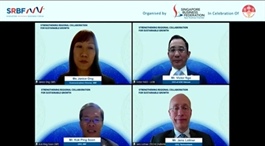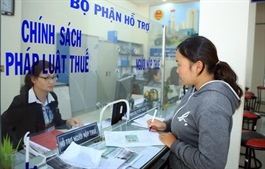Vietnam grapples with challenges in cashless payments
Vietnam grapples with challenges in cashless payments
The evolution of cashless payments in Vietnam came under the spotlight at a recent conference convened by the Institute for Digital Economy Strategy (IDS) in Ho Chi Minh City. The seminar aimed to analyse the existing legislative landscape, identify barriers to advancement, and propose potential regulatory enhancements to bolster cashless transactions.
The conference, overseen by Dr. Hoang Van Ninh, deputy director of the IDS, marked a critical step towards formulating a robust legal system designed to effectively manage and accelerate the progress of cashless payments.
The broader agenda encompassed a comprehensive overview of the sector, scrutiny of legislative obstacles, and the development of strategies to streamline the cashless payment system.
Dr. Nguyen Quoc Hung, general secretary of the Vietnam Banking Association, outlined the current state of play in the cashless sector.
“Approximately 68.7 million personal accounts have been opened at commercial banks, with a majority of credit institutions and commercial banks offering internet and mobile payment services respectively,” Hung said.
Furthermore, the State Bank of Vietnam (SBV) has issued operation licences to 21 intermediary payment service providers, bolstering the drive towards cashless transactions.
However, the legislative infrastructure required to regulate electronic payments is still in its nascent stages. Hung expressed concerns about the lack of clear guidelines pertaining to online payment services, virtual and electronic currencies, and other multifaceted issues. Many of these challenges are either yet to be addressed by regulators or are in the preliminary stages of development.
A key focus of the conference was the advancements made since 2016. An array of legal regulations related to the payment sector were enacted, forging a legal pathway for providers of payment services to offer diverse products leveraging modern payment technologies.
In addition, the Vietnamese government has tasked the SBV with the responsibility of formulating several decrees influencing cashless payment operations. These legislative instruments will endeavour to explicitly define the nature of payment tools and the regulatory mechanisms that manage these instruments, specifically addressing the management of electronic money.
Dr. Tran Van, director of the IDS, noted that the development of cashless payments remains a significant challenge for policymakers in Vietnam.
“Cashless payment services are primarily geared towards urban residents with substantial incomes, while areas such as rural and remote regions remain under-served. Therefore, perfecting the legal corridor to facilitate cashless payments, encouraging innovation, and effectively performing state management functions in the digital economy is essential,” he stated.
Van also highlighted the importance of investment in infrastructure and technology to improve the quality and effectiveness of cashless payments. Current cashless payment methods rely heavily on technology applications and the strong growth of fintech, featuring a variety of new, safe, and convenient products.
Emerging technologies in payment fields, such as ATM, POS, internet/mobile payment, QR Code, contactless payment, super apps from some fintechs, have achieved positive results. The scale of transactions via modern payment channels has grown rapidly, making Vietnam one of the fastest-growing markets globally.
According to the Telecommunications Department of the Ministry of Information and Communications, Vietnam has seen a significant surge in the adoption of Mobile Money services, with over 3.9 million users, a 6.3 per cent increase compared to March 2023 and three times higher than the same period in April 2022.
Specifically, the number of Mobile Money users in rural areas, mountainous regions, and remote areas has reached over 2.7 million, accounting for 69 per cent of total users.
Currently, there are 9,953 Mobile Money service providers throughout the country, marking a 12 per cent increase compared to March 2023. The number of establishments accepting Mobile Money payments has reached 15,326, reflecting a marginal 0.2 per cent growth.
The total number of Mobile Money transactions, including deposits, withdrawals, fund transfers, and payments, has exceeded 26.1 million, with a transaction value exceeding VND1.68 trillion.
According to Van, the principal challenge inhibiting the growth of cashless payments is their restricted availability. Currently, these services predominantly target urban dwellers with substantial income levels, while rural and remote areas remain ovdrlooked.
To facilitate the growth of cashless transactions, Van stressed the need to redefine the legal framework, encourage technological innovation, and ensure effective governance in the digital economy.
The director also emphasised the crucial role of infrastructure and technology in elevating the performance and effectiveness of cashless payments. Notably, IT and fintech form the bedrock of current cashless payment systems, contributing to the sector’s diversity and facilitating the introduction of new, secure, and convenient methods.
As Vietnam witnesses significant growth in the transaction scale of modern payment methods, it is emerging as one of the fastest-expanding markets globally.
Despite these positive strides, the development of cashless payments remains an uphill task, particularly due to the limitations in extending these services beyond the urban communities. The challenge ahead lies in creating an inclusive financial landscape, capable of reaching the farthest corners of the country.
The Visa Consumer Payment Attitudes Study 2022 also revealed that approximately two-thirds of Vietnamese respondents said they expect Vietnam to be a cashless society by 2030. Furthermore, cash usage in Vietnam has fallen since 2020, while 89 per cent of respondents said they use mobile wallets, and 85 per cent use credit and debit cards, primarily for online and contactless payments.





















